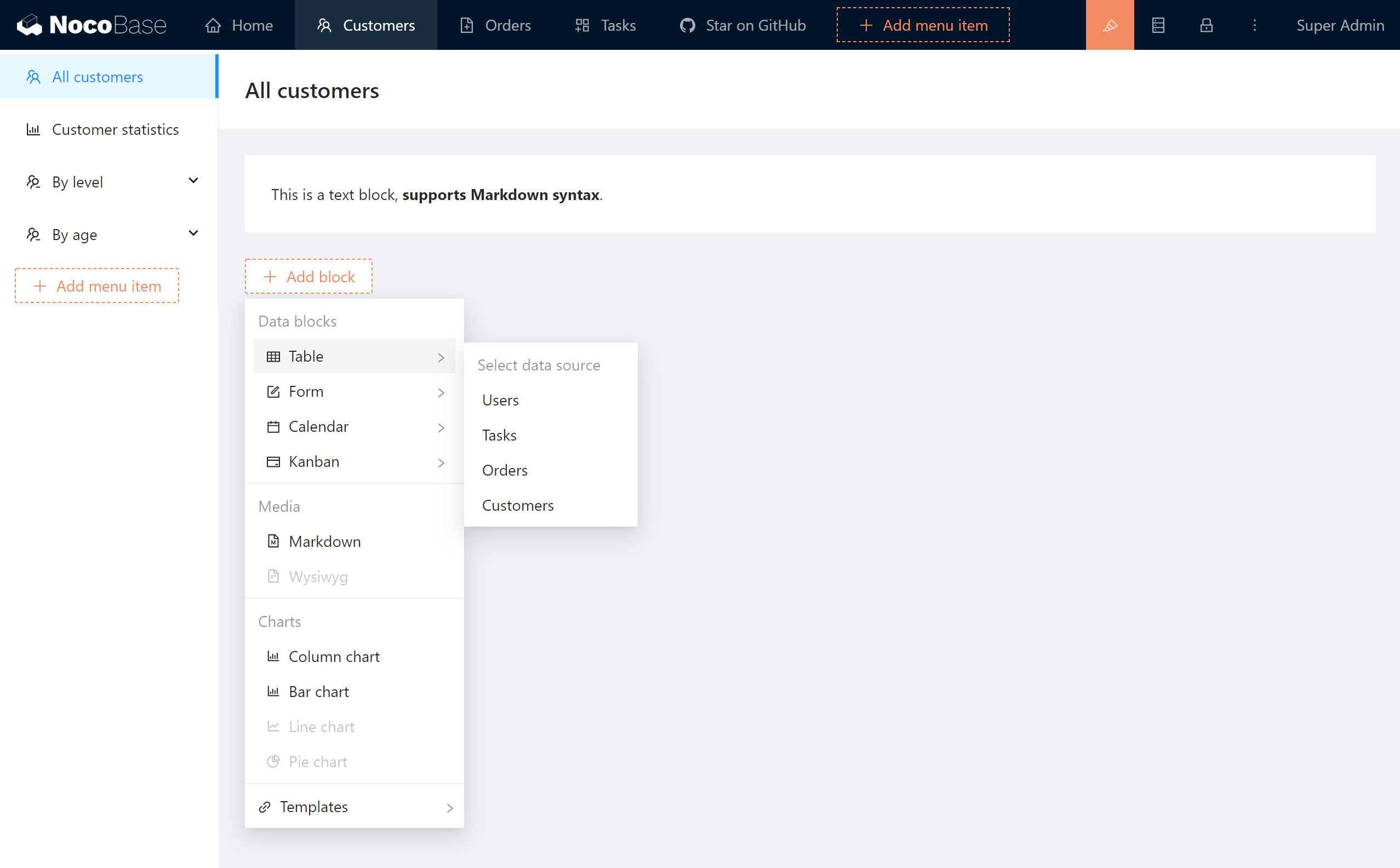mirror of
https://github.com/nocobase/nocobase
synced 2024-11-15 13:37:37 +00:00
146 lines
3.9 KiB
Markdown
146 lines
3.9 KiB
Markdown
English | [简体中文](./README.zh-CN.md)
|
|
|
|

|
|
|
|
What is NocoBase
|
|
----------
|
|
NocoBase is a scalability-first, open-source no-code development platform. No programming required, build your own collaboration platform, management system with NocoBase in minutes.
|
|
|
|
Homepage:
|
|
https://www.nocobase.com/
|
|
|
|
Online Demo:
|
|
https://demo.nocobase.com/new
|
|
|
|
Contact Us:
|
|
hello@nocobase.com
|
|
|
|
When to use NocoBase
|
|
----------
|
|
- **SMEs and organizations build business platforms and management systems for themselves or for their industry**
|
|
- Want the price to be low enough or even free
|
|
- Can be flexibly customized without programming knowledge
|
|
- Need full control of source code and data
|
|
- Can freely distribute and sell as their own products
|
|
- **Service providers and outsourcing teams develop collaboration platforms and management systems for their clients**
|
|
- Want to keep development costs as low as possible
|
|
- Need the most user-friendly secondary development experience
|
|
- Must be deployed privately as a standalone product for the client
|
|
- Can be freely distributed and sold by the client
|
|
|
|
Why choose NocoBase
|
|
----------
|
|
- **Open source and free**
|
|
- Unrestricted commercial use under the MIT license
|
|
- Full code ownership, private deployment, private and secure data
|
|
- Free to expand and develop for actual needs
|
|
- Good ecological support
|
|
- **Strong no-code capability**
|
|
- WYSIWYG visual configuration
|
|
- Separation of data structure configuration from interface configuration
|
|
- Rich combination of blocks and operations
|
|
- Role-based access control
|
|
- **Developer-friendly**
|
|
- Microkernel architecture, flexible and easy to extend, with a robust plug-in system
|
|
- Node.js-based, with popular frameworks and technologies, including Koa, Sequelize, React, Formily, Ant Design, etc.
|
|
- Progressive development, easy for getting-started, friendly to newcomers
|
|
- No binding, no strong dependencies, can be used in any combination or extensions, can be used in existing projects
|
|
|
|
Note
|
|
----------
|
|
NocoBase is still in early development and is for preview purposes only and is not suitable for use in a production environment. A relatively stable and well-documented public beta is expected to be released as early as the first quarter of 2022.
|
|
If you are interested in NocoBase, please join us to discuss and develop it together.
|
|
|
|
Architecture
|
|
----------
|
|
|
|

|
|
|
|
Requirements
|
|
----------
|
|
|
|
Node:
|
|
|
|
- Node.js 12.20+
|
|
|
|
Database:
|
|
|
|
- PostgreSQL 10.x+
|
|
- MySQL 8.x+
|
|
- SQLite 3+
|
|
|
|
Installation
|
|
----------
|
|
|
|
## Create a project with `create-nocobase-app`
|
|
|
|
~~~shell
|
|
# 1. create project
|
|
# SQLite
|
|
yarn create nocobase-app my-nocobase-app -d sqlite
|
|
# MySQL
|
|
yarn create nocobase-app my-nocobase-app -d mysql \
|
|
-e DB_HOST=mysql \
|
|
-e DB_PORT=3356 \
|
|
-e DB_DATABASE=nocobase \
|
|
-e DB_USER=nocobase \
|
|
-e DB_PASSWORD=nocobase
|
|
# PostgreSQL
|
|
yarn create nocobase-app my-nocobase-app -d postgres \
|
|
-e DB_HOST=postgres \
|
|
-e DB_PORT=5432 \
|
|
-e DB_DATABASE=postgres \
|
|
-e DB_USER=postgres \
|
|
-e DB_PASSWORD=postgres
|
|
|
|
# 2. switch to the project directory
|
|
cd my-nocobase-app
|
|
|
|
# 3. Install dependencies
|
|
yarn install
|
|
|
|
# 4. Install NocoBase
|
|
yarn nocobase install --lang=en-US
|
|
|
|
# 5. start project
|
|
yarn start
|
|
~~~
|
|
|
|
Open [http://localhost:8000](http://localhost:8000) in a web browser. The initial account and password are `admin@nocobase.com` and `admin123`.
|
|
|
|
## Contributing
|
|
|
|
- Fork the source code to your own repository
|
|
- Modify source code
|
|
- Submit pull request
|
|
|
|
```bash
|
|
# Replace the following git address with your own repo
|
|
git clone https://github.com/nocobase/nocobase.git
|
|
cd nocobase
|
|
cp .env.example .env
|
|
yarn install
|
|
yarn nocobase install
|
|
yarn start
|
|
```
|
|
|
|
### Building
|
|
|
|
```bash
|
|
# For all packages
|
|
yarn build
|
|
|
|
# For specific package
|
|
yarn build --scope @nocobase/database
|
|
```
|
|
|
|
### Testing
|
|
|
|
```bash
|
|
# For all packages
|
|
yarn test
|
|
|
|
# For specific package
|
|
yarn test packages/<name>
|
|
```
|